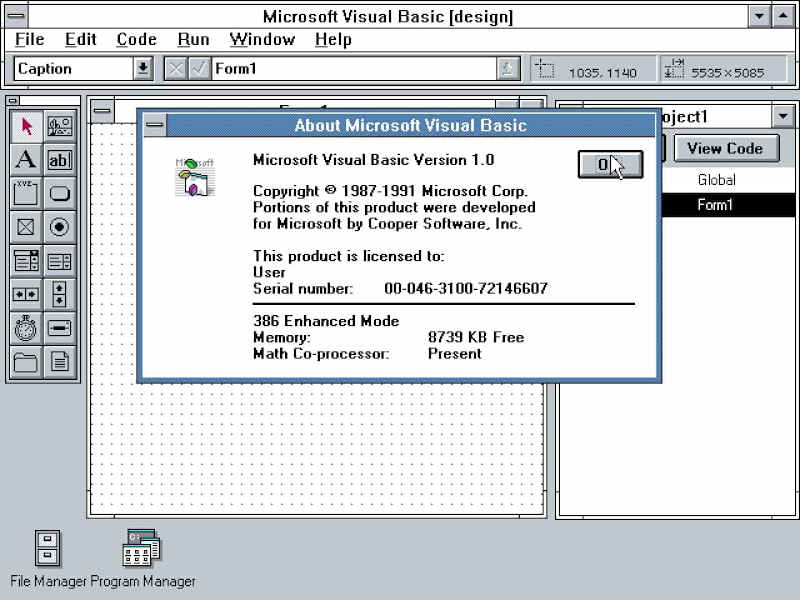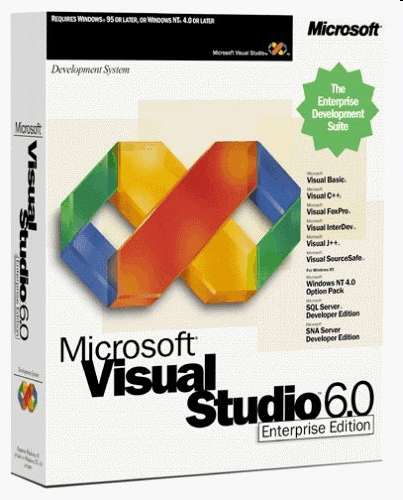| News From The Past - Something Pretty Right |
| Written by Mike James | |||
| Friday, 31 March 2023 | |||
|
The past is a guide to the future, but sometimes you are just left wondering what went so wrong that we couldn't have the future we were promised. So it is with Something Pretty Right which tells the story of Visual Basic - its rise and its assassination. All down to Microsoft. This is literally old news, but I do urge you to read Something Pretty Right. It is an account of the invention of Visual Basic and its extraordinary impact on the programming world. If you are relatively new to programming you might not even have heard of Visual Basic or if you have you regard it as something old and primitive. Even if you do know something about it you might not appreciate what it did to programming when it was introduced in 1991. At that time we were using Windows, but there was no easy way to write programs that had a UI. If you wanted to create a simple program you could use Basic but only to create command line programs or low res graphics. There were no buttons or anything similar to use in your programs. If you wanted forms and buttons then you had little choice but to program it in C using the Windows API. Back then the Windows API wasn't anything like the civilized thing it is today - I lie it's not civilized today!. It was tough and the only thing that made it even slightly possible was the book Programming Windows by Charles Petzold - a work that cost him so much that he had the Windows logo tattooed on his forearm. Even with the help of the book, it was still a difficult task to create a Windows application. Then Visual Basic appeared and it had a drag-and-drop form designer and a simple event handling approach that made creating Windows apps not only possible but easy - trivial even. The revolution was immediate. One day there were few Windows applications and very very few custom applications. Then there was Visual Basic and the next day there were lots and lots of applications and designing a custom application was a mass market occupation.
The fact that Visual Basic revolutionized everything about Windows programming was partly the reason Windows became a must have. However, today it is easy too look back on Visual Basic and dismiss it as a primitive language lacking proper object-oriented features and having no deep theoretical structure. This is a misunderstanding. Visual Basic made programming easy and it quickly evolved into something sophisticated. It always had its rough edges, but it was really usable in a way that today's languages have simply forgotten about. It made it possible for large numbers of people to learn programming. It was what I like to think of as a "street" language - born of the practicalities of what people actually wanted to do. Today's languages have a shine given to them by academic principles - yes Haskell I'm looking at you - that raise the bar to getting started. Equally the drag-and-drop approach was revolutionary. As Bill Gates explained: "After all, the best way to design a form is to draw the form, not write code to reproduce it. With a mouse and a palette of pre-dawn graphics images, you should be able to combine lines, boxes, and buttons interactively on a screen to design a form for a program. That kind of interactive design of objects should also let you attach to or combine your creations within a program." Yet there are still languages and designers who think that declarative/imperative is the way to go. For example Android had a perfectly good drag-and-drop editor but recently dropped it in favour of an imperative graphics system called Compose - unbelievable! Visual Basic was a breakthrough language that had the power to change the world into the 21st century. But for reasons that are complex Microsoft killed it. To quote from Something Pretty Right: "By the time Visual Basic 6.0 was released in 1998, its dominance was absolute: two-thirds of all business application programming on Windows PCs was done in Visual Basic. At its peak, Visual Basic had nearly 3.5 million developers worldwide, more than ten times the number of C++ programmers." From this position of sucess Microsoft would have been mad to kill it off, but they did: "In the late 1990s, partially in response to the competitive threat of Sun's Java, Microsoft shifted its focus to a new development framework and common language runtime called .NET. Microsoft pushed hard for developers to adopt .NET, and Visual Basic was pulled into a ground-up rewrite to move it from a procedural language to an object-oriented one better suited to the new framework. The successor to Visual Basic 6.0, dubbed VB.NET and released in 2002, completely changed the ethos of the product, and turned out to be the death knell for the original idea of Visual Basic." Today there are still programmers who miss Visual Basic, me included, and Microsoft still won't do anything about releasing it as open source. Let this be a lesson to any programmer happy to work in a closed source language...
Now read Something Pretty Right and enjoy a very strange story of corporate vision and mismanagement.
More InformationRelated ArticlesVisual Basic Reaches 25th Birthday - Microsoft Censors Campaign To Open Source VB6 Classic VB is 20 and still missed by many Microsoft Refuses To Open Source VB6
To be informed about new articles on I Programmer, sign up for our weekly newsletter, subscribe to the RSS feed and follow us on Facebook or Linkedin.
Comments
or email your comment to: comments@i-programmer.info
|
|||
| Last Updated ( Friday, 31 March 2023 ) |



